Introduction: In this article, Melissa Davenport Berry continues to show how paternity cases affected life in the 17th century Massachusetts Bay Colony – and, in particular, describes how the results of those cases impacted some of the leading families in Newbury, Massachusetts. Melissa is a genealogist who has a blog, AnceStory Archives, and a Facebook group, New England Family Genealogy and History.
My last three stories (see links at the end of this article) covered the paternity cases of Joseph Mayo in the 17th century Massachusetts Bay Colony. In one of the cases, he fathered a child with Hannah Adams, a single woman in Newbury, Massachusetts. Hannah’s brother Abraham Adams acted as her attorney, and petitioned the court for child support on her behalf – and won.
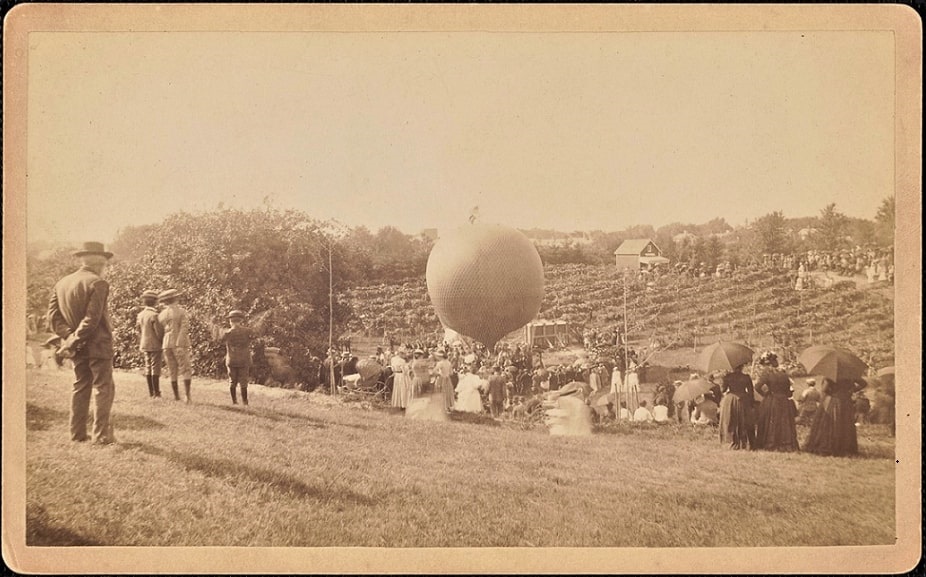
I have uncovered more court drama on Abraham and his family, found in Lost Babes: Fornication Abstracts from Court Records, Essex County, Massachusetts, 1692-1745, transcribed and published by the highly regarded genealogist Melinda Lutz Sanborn.
Abraham Adams (son of prominent Newbury first settler Robert Adams) married Mary Pettengill (daughter of Richard and Joanna Ingersoll Pettengill). The couple had several children, including two daughters – Mary and Sarah – who are connected with two paternity cases cited in Sanborn’s book. In today’s article, I’ll focus on Mary. Sarah will be next.
The first case involved the husband of Mary Adams, George Thurlow (son of Thomas and Judith March Thurlow). Note: name variations in the old records include Thorlo, Thurloe, and Thurley.
In 1697, Abraham Adams petitioned the court for custody of Mary Danforth’s child (Rebecca Danforth), fathered by his son-in-law George Thurlow. George had married Abraham’s daughter Mary Adams in 1694. The child he fathered with Mary Danforth was born 19 May 1695. You can probably figure out what went down here.
According to court records, on 5 August 1695 Mary Danforth accused George of fathering her child and requested that he pay maintenance of 40s. In that same session George was fined for striking Mary Danforth with a bottle.
Then on 30 June 1696, Abraham petitioned the court to keep the child his son-in-law George was reputed to have fathered. The court agreed with Abraham and ordered that Mary Danforth surrender the child.
Whatever happened, a year later Abraham was back in court again on 13 July 1697. According to the court records in Sanborn’s book:
“Mr. Abraham Adams petitions that his son-in-law George Thurlow is in a delirious sad condition and cannot support himself, let alone another. He will take Mary Danforth’s child into his house and hold the town of Newbury harmless for its maintenance if they lift the 15d/week charge.” (p. 6)
Abraham’s power and influence saved the town from having another child on the dole, and allowed his son-in-law George to establish some stability. I am guessing he may have liked to party a little too much. Despite the scandal, George and his wife Mary stayed together – and their children make up generations of the sons and daughters of Newbury.
George’s out-of-wedlock daughter Rebecca Danforth married John/Francis Akers (son of Henry and Hannah Silver Akers). I am working on that family line.
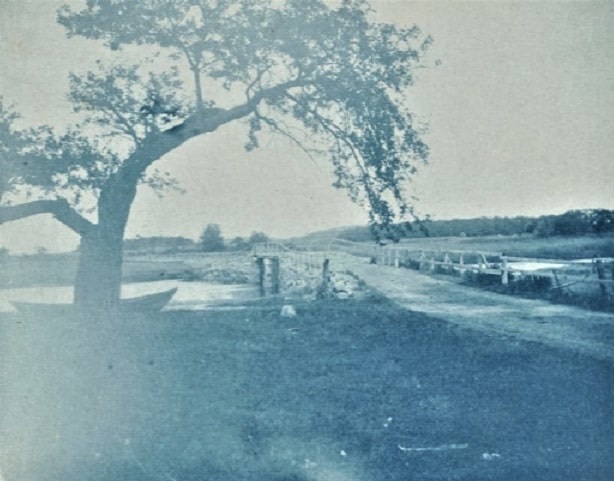
George Thurlow’s family were one of the original settlers in Newbury, Massachusetts, and built Thurlow’s Bridge over the Parker River. George and Mary’s great grandson, also named George, started the renowned Cherry Hill Nurseries. He married Susan Chase, a direct descendant of Newbury settler Aquila Chase.
I found some stories on George Thurlow’s nursery. In 1852, the Newburyport Morning Herald gave kudos to Thurlow’s “Bradstreet Seedling Potatoes” and noted: “Probably, no farm in the county is so abundantly supplied with orcharding of young vigorous trees, as is Mr. Thurlow’s.”
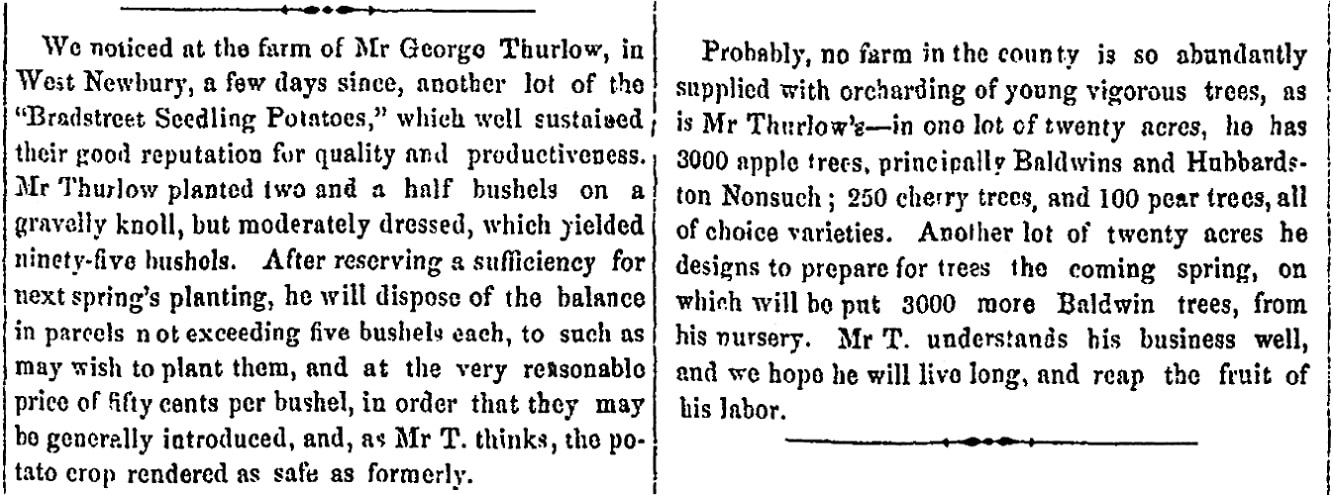
George’s son, Thomas Chase Thurlow, made many headlines running the nursery. A fun tidbit found in the Daily Evening Bulletin reported that Prof. James Allen made a balloon landing for the night on Thomas Thurlow’s farm (see photo above). A large crowd of spectators gathered in the morning to see the hot-air balloon, and “Before going up he gave several of the ladies present a sail in the air to the height of about three hundred feet.”
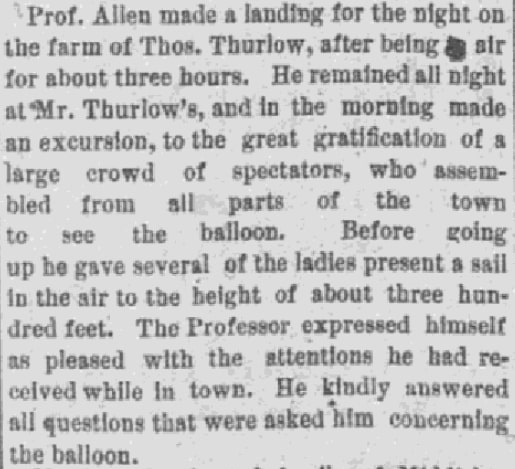
The Boston Herald featured a story in 1905 on Thomas Chase Thurlow’s magical nursey and his peonies. The story noted Thomas “comes from good old stock” and descends from a race of nurserymen.
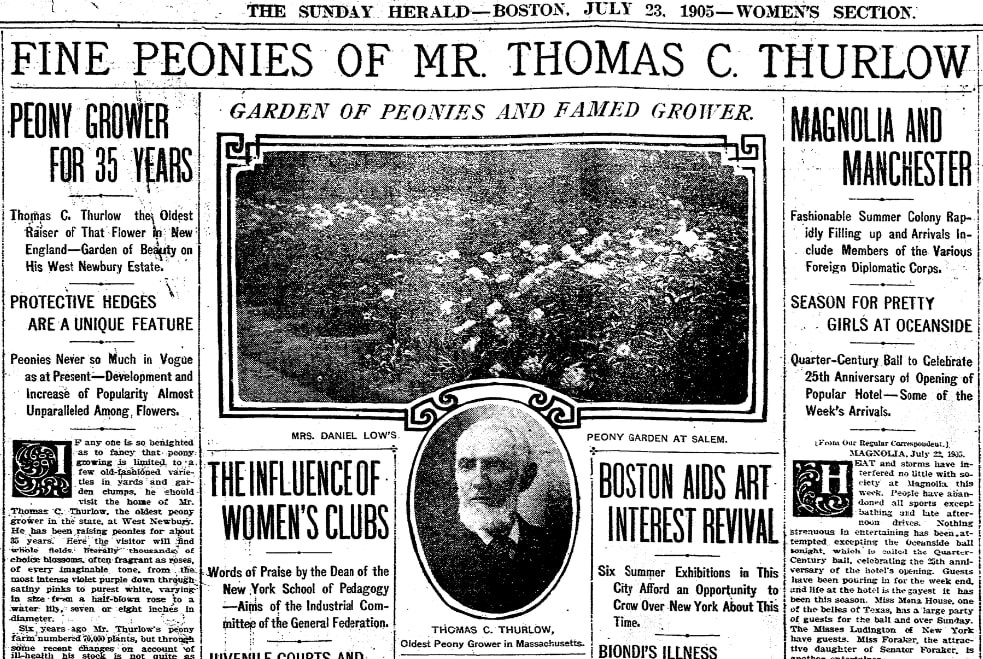
Thanks to Susan York Gagnon.
Next up: Sarah Adams’ court drama…
Note: Just as an online collection of newspapers, such as GenealogyBank’s Historical Newspaper Archives, helped tell the stories of the Thurlow family, they can tell you stories about your ancestors that can’t be found anywhere else. Come look today and see what you can discover!
Related Articles:
